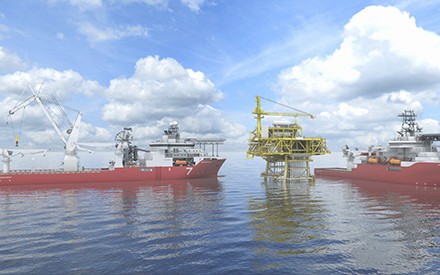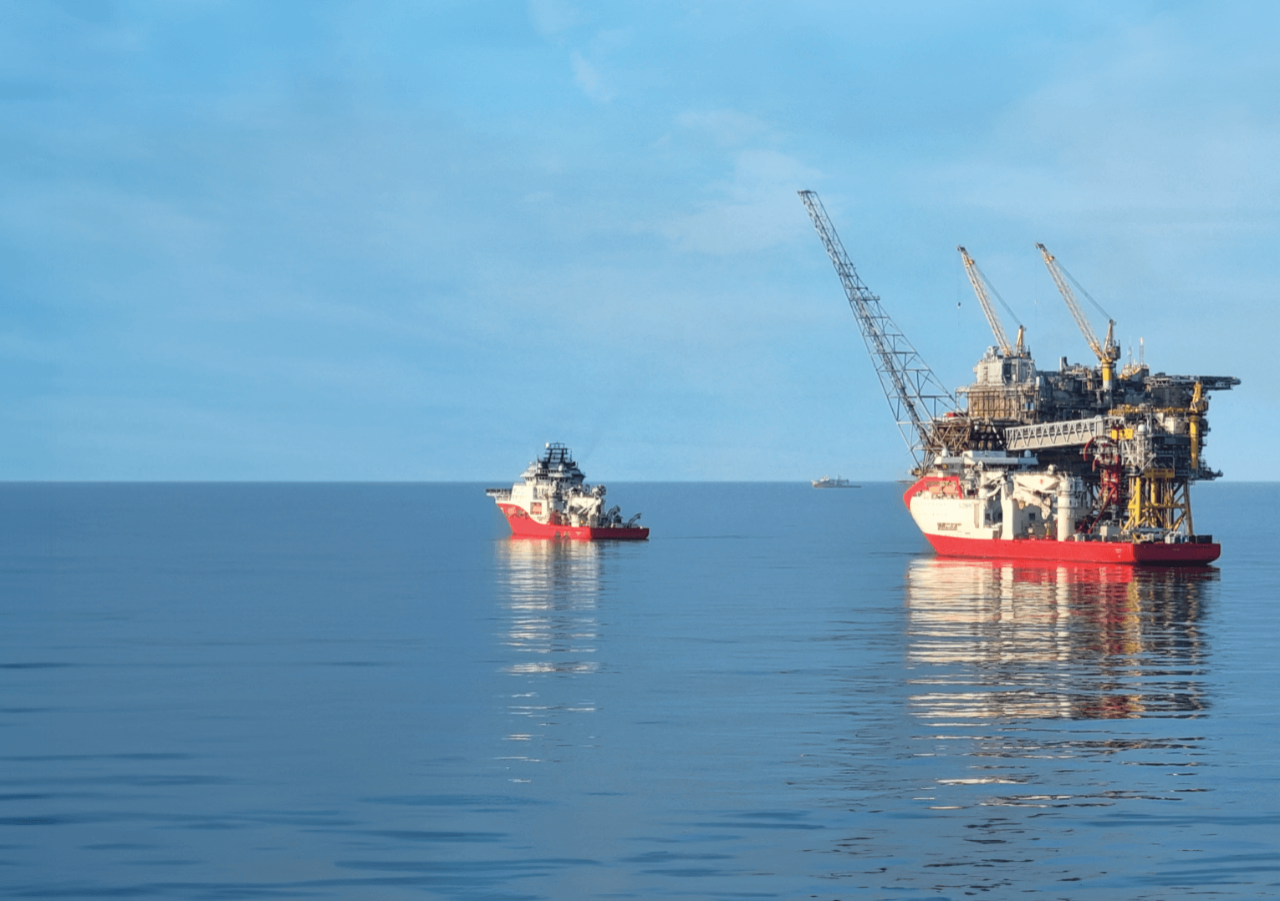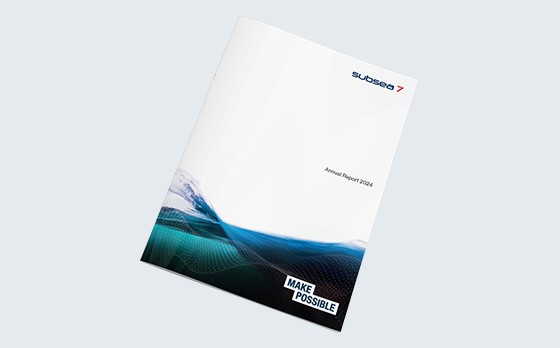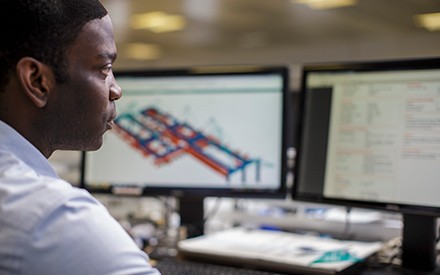Human Rights Programme
Subsea7 Group has a human rights programme designed to:
- embed our Human Rights Policy Statement and the relevant aspects of our Code of Conduct; and
- identify and manage human rights risks across our own operations and within our supply chain, with a particular emphasis on the risks of the most egregious impacts, namely child labour, slavery and trafficking, and other forms of forced or involuntary labour; and thereby
- give effect to our commitments under the UN Global Compact and the ILO Standards in relation to child labour; and
- address existing and emerging stakeholder and regulatory expectations and requirements, such as the UK Modern Slavery Act, the Norwegian Transparency Act and applicable, forthcoming EU corporate sustainability due diligence laws.
The programme is informed and underpinned by our Values and our Board’s determination to manage the human rights impacts of our business.
Our programme is summarised in this graphic:

Wherever possible and desirable, our human rights programme seeks to learn from and leverage various aspects of our compliance and ethics programme, such as risk assessments, due diligence, training and supply chain management procedures.
The programme is described in more detail below:
Top Level Commitment
Subsea7 is proud to be a signatory to the UN Global Compact, in which the United Nations has set out 10 principles covering human rights, labour, environment and anti-corruption.
Since 2019 we have had a ‘Sustainability’ Value that specifically focuses on our environmental and societal behaviours and defines Labour Practices and Human Rights as one of our six Sustainability focus areas.
The Subsea7 Group has an Executive Ethics Committee, which comprises all the members of the Executive Management Team. The Ethics Committee receives reports from the Chief Ethics and Compliance Officer (CECO) and any independent assurance provider on the implementation of the human rights programme. Such reports are provided to the Subsea 7 S.A. Board Corporate Governance and Nominations Committee, which is chaired by the Senior Independent Director.
Human Rights is a management accountability, but Human Resources (HR) and Supply Chain Management (SCM) are two functions with key roles to play. Our efforts are led by the CECO, who has overall responsibility for the design of the programme. In addition, Subsea7 is developing a network of human rights “champions”, whose role will be to help local and regional management understand and fulfil their accountability, and to provide subject matter expertise and guidance. Our efforts are led by the CECO, who has overall responsibility for the design of the programme.
Subsea7 is a Board Member of the Building Responsibly organisation, a global business-led coalition committed to promoting the rights and welfare of workers in the energy and construction sectors. We support the Building Responsibly Worker Welfare Principles.
Risk Assessment and Due Diligence
Our human rights programme is risk-based and is designed and implemented on the basis of risk assessments carried out for each region and business unit and updated regularly. A risk assessment is conducted for every country, and on entry into a new high-risk country. This risk assessment includes corruption and human rights risks.
The above risk assessments assess the risks within our own operations.
Risk assessment and due diligence are also built into our SCM procedures, as well as our procedures for selecting and appointing business partners and other third parties. Suppliers are risk-tiered on the basis of the country in which they operate and the category of materials or services they provide. To assist us with our mapping of modern slavery and human trafficking risks, we commissioned GoodCorporation™, an independent, expert firm. We consider the most significant risk factors to be material and services categories which might involve underage workers, or vulnerable, low-skilled migrant workers from high-risk countries who work in countries in which they are not resident, or on our vessels.
Suppliers deemed to be high-risk must complete a human rights due diligence questionnaire, whereas those considered medium-risk complete a short-form risk assessment questionnaire, designed to validate whether they need to complete the full questionnaire. All medium- and high-risk suppliers also undergo due diligence screening (via our third-party risk assessment and due diligence platform).
We have identified the following risks, which would have the most egregious impacts, as our priority focus areas in the short- to medium term:
- Child labour
- Slavery and trafficking
- Other forms of forced or involuntary labour
Accordingly, our risk assessments focus, in particular, on which parts of our operations or supply chain might involve vulnerable migrant or underage workers.
We subscribe to the Verisk Maplecroft human rights risk indices, which we have used to provide a more granular and reliable human rights risk tiering of the countries in which we or our suppliers operate. This risk-tiering:
- is integrated into our supply chain risk assessment and due diligence procedures;
- is integrated into our country risk assessment tool (which helps assess risk within our own operations); and
- informs our risk assessment of our own sites, vessel and operations.
Our aim is to get to a point where we can understand and manage human rights risks farther down our supply chain sooner, i.e. by identifying where a low-risk tier 1 supplier may have higher-risk suppliers directly or indirectly beneath it in our supply chain. For this reason, we need to go deeper rather than broader with our risk focus.
Human Rights Policy Statement and Other Policies
Our human rights programme is underpinned by our Human Rights Policy Statement and Code of Conduct. Both documents have been adopted by the Board of Directors of Subsea 7 S.A. and are regularly reviewed and updated. The Human Rights Policy Statement is one of our three highest level policy statements. It sits alongside our Ethics Policy Statement and HSEQ Policy Statement, and all three statements are displayed prominently at our offices and sites.
Our Human Rights Policy Statement and Ethics Policy Statement, along with our Code of Conduct and Code of Conduct for Suppliers, can be found at:
Labour Practices and Human Rights
Code of Conduct
The Subsea 7 Code of Conduct (the Code) is applicable to all personnel working for and on behalf of Subsea 7 globally, including direct employees and agency and contract staff. The Code sets out our commitment to conducting business fairly and ethically, including by treating our employees, clients, contractors and suppliers fairly and with respect. It also provides guidance on how to ensure we uphold our commitments. Enhancements to the Code when it was refreshed in 2019 included more prominent and engaging sections on human trafficking, forced labour and other human rights abuses.
All Subsea 7 direct employees are required to sign up to the Code of Conduct on joining the business. They also take an e-learning module on the Code of Conduct.
Code of Conduct for Suppliers
The Subsea 7 Code of Conduct for Suppliers is incorporated into our standard terms and conditions for suppliers and was refreshed in 2019. It includes mutual commitments to:
- Ethical business conduct, including with regard to anti-corruption
- Health, safety and security.
- Human rights and fair and lawful employment practices across Subsea 7 and throughout our supply chain.
- As a minimum, complying with national legal requirements regarding wages and working hours.
- Support the International Labour Organisation’s standards regarding child labour and minimum age.
- Prevent modern slavery and human trafficking anywhere in our business or supply chain.
- Uphold the same standards when dealing with employees, contract staff and sub-contractors.
In addition, our human rights programme includes the following policies not mentioned elsewhere in this summary:
- Our Speak Up Policy (see section below)
- Our SCM Process for Procurement (see section below)
Communication, Education and Training
The Subsea7 Group undertakes training for all relevant personnel to ensure that the Subsea7 Code of Conduct is fully understood and properly applied, and that all staff understand and help to uphold the Group’s commitment to doing business ethically and with integrity, including with regard to its human rights commitments. The training is overseen by the CECO, who also ensures that such training is reviewed and refreshed annually. The training is delivered by interactive e-learning.
In addition, a targeted audience participates in human rights training workshops, to ensure they understand the topic and the company’s commitments and focus areas. We engaged GoodCorporation™, an independent, expert firm, to help design and quality assure that training and to co-deliver many of the sessions. The target audience comprises those whose roles mean they can and need to play a role in helping to identify and manage human rights risks.
Speak Up Channels and Culture; and Grievance Procedures
We have a clear Speak Up Policy, which is summarised in the Code of Conduct and explained in fuller detail in a separate policy. It offers various channels for raising concerns, including an externally administered and monitored confidential reporting line (Safecall), which is extensively promoted within Subsea7, as well as to our suppliers. All personnel are encouraged to utilise one of these reporting channels if they become aware of a possible breach of our Code of Conduct or have concerns in respect of unethical conduct, including human rights breaches.
Grievance policies and mechanisms are established to provide, in line with the Global Grievance Procedure and local legislation, a fair and effective procedure for resolving individual grievances on matters such as working practices, health and safety, fair treatment, or terms and conditions of employment. Any grievance relating to labour practices can be raised according to these procedures.
Procedures and Controls
All wholly-owned entities in the Subsea7 Group have adopted and implemented the Code of Conduct and Human Rights Programme, as part of the Group-wide Business Management System, which includes a system of internal controls consistent with a publicly listed company. This includes human resources and supply chain management procedures, such as for instance recruitment and induction procedures, or supplier due diligence procedure, and record-keeping requirements.
We have robust qualification procedures for our direct suppliers, and for suppliers from high-risk countries this includes a risk screening and due diligence process (as mentioned above). They are contractually required to comply with our policies in relation to safety, quality, environmental and business ethics, including anti-corruption and human rights; and to require their own suppliers to operate to the same standards.
Our Human Rights Policy Statement and Code of Conduct are underpinned by a Group-wide Human Rights Procedure, which sets out our policy commitments more specifically, and provides guidance on how they are implemented across our own operations and our supply chain, the role of the various associated procedures, and where they can be found.
Investigations, Remediation and Enforcement
All allegations of human rights breaches received via Safecall or internal channels are reported to the CECO, who logs them on a case management system and oversees their investigation by appropriately independent managers, in accordance with the Group Compliance and Ethics Investigations Principles and Procedure.
If Subsea7 received reports of concerns regarding slavery or human trafficking in our operations or our supply chain, we would undertake an urgent, thorough investigation into the concerns raised under the supervision of the CECO and, potentially, the Ethics Committee. If the investigation confirmed the concerns, we would put in place robust action plans to address the issue and protect the victims.
We use our case management system to track Speak Up and other human rights cases and investigation metrics, such as number of reports received, the types of misconduct alleged or suspected, and remedial measures taken. We use such metrics to assess areas for improvement in our programme, and we report on them to the Ethics Committee and the Corporate Governance and Nominations Committee.
Grievances are handled in accordance with the applicable grievance procedure, as mentioned in the relevant section above.
Monitoring, Auditing and Assurance
Subsea7 Group monitors and reviews its human rights programme to ensure it is up to date, properly implemented and continually improved, consistent with current and emerging stakeholder expectations and regulatory requirements.
We monitor Speak Up and other human rights cases to spot human rights breaches, or actual or potential weaknesses or failures in our human rights programme.
As our programme matures, our human rights programme will be included within the scope of our Internal Audit function’s work. We will also aim to develop efficient, cost-effective methods of obtaining a greater degree of assurance from high-risk suppliers that they have implemented the prescribed procedures to manage the potential human rights risks we have identified. Such methods would include monitoring, virtual and in-person audits, as well as evidence that the supplier has been audited by a credible, independent assurance provider.
To track progress against our focus on Human Rights and Labour Practices, including Modern Slavery and Human Trafficking, we have developed KPI’s which are presented in our Sustainability Report on an annual basis and can be found here:
We welcome any questions or comments about our Human Rights Programme, which the CECO is available to discuss with you at any time.
Contact information:
Andrew Hayward, Chief Ethics and Compliance Officer
E: Andrew.hayward@subsea7.com
T: +44 20 8210 5555





